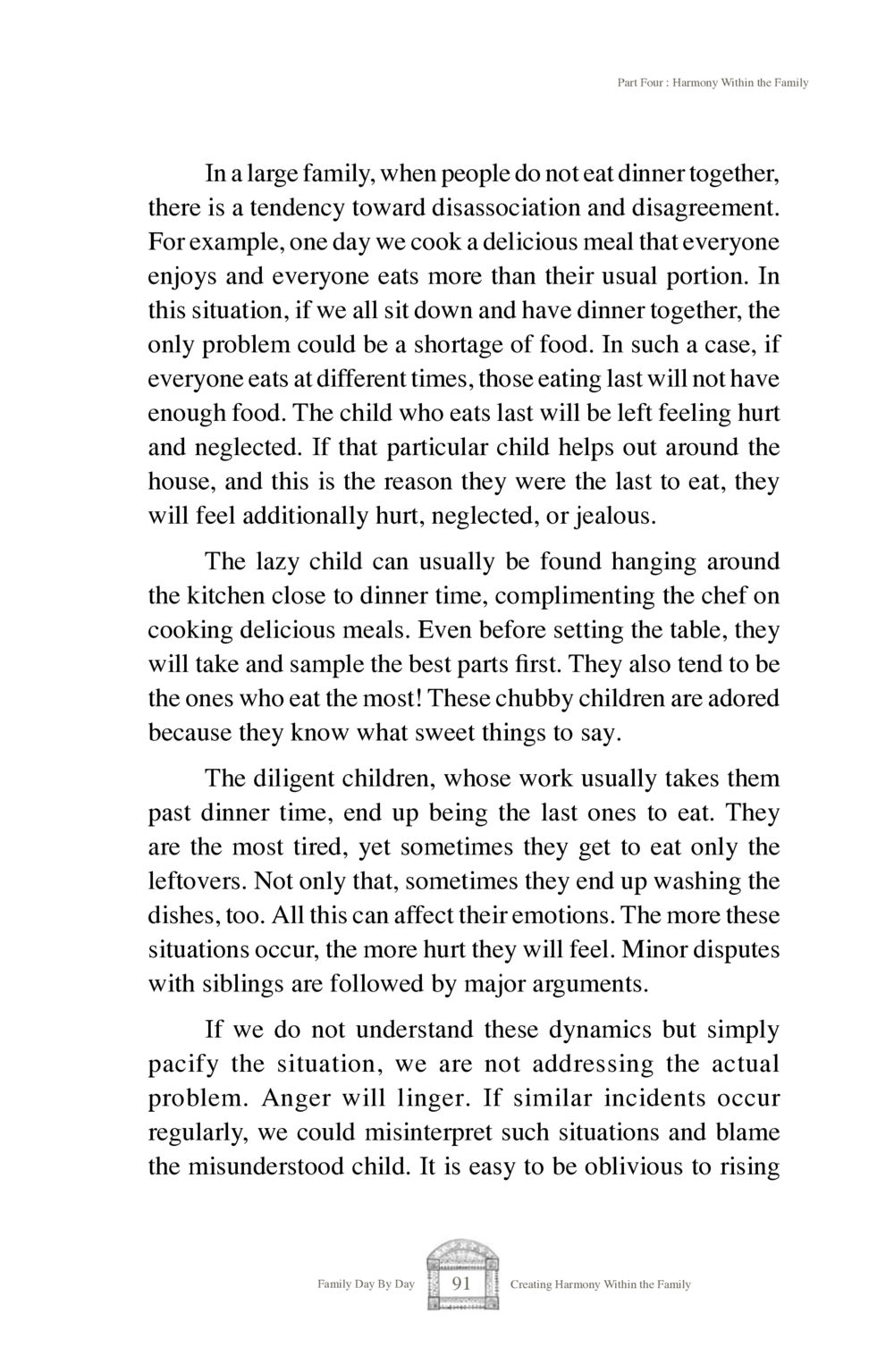Creating Harmony Within the Family : หน้า 93/216
Family Day By Day : หน้า 93/216 Understanding family dynamics around mealtimes to promote unity and prevent discontent.
0 ครั้ง

สรุปเนื้อหา
บทความนี้กล่าวถึงความสำคัญของการรับประทานอาหารเย็นร่วมกันในครอบครัวใหญ่เพื่อสร้างความสามัคคี หากสมาชิกในครอบครัวไม่สามารถรับประทานอาหารร่วมกัน จะส่งผลให้เกิดความรู้สึกโดดเดี่ยวและไม่พอใจได้ ซึ่งเด็กที่กินอาหารช้าจะรู้สึกถูกทอดทิ้ง หรือเด็กที่ขยันทำงานกลับมากินข้าวหลังจากที่คนอื่นกินไปหมดแล้วส่งผลอารมณ์ที่ไม่ดีต่อพวกเขา การมองข้ามปัญหาเหล่านี้ทำให้ความโกรธสะสม และอาจทำให้เข้าใจผิดในความรู้สึกของเด็กในครอบครัวได้ เราควรหาโอกาสในการสื่อสารและอยู่ร่วมกันเพื่อสร้างความรักและความสุขในครอบครัวได้มากขึ้น dmc.tv
หัวข้อประเด็น
-ความสำคัญการรับประทานอาหารร่วมกัน
-ผลกระทบจากการรับประทานอาหารเวลาไม่ตรงกัน
-การจัดการกับอารมณ์ในครอบครัว
-การสื่อสารและความเข้าใจในครอบครัว
ข้อความต้นฉบับในหน้า
Part Four: Harmony Within the Family
In a large family, when people do not eat dinner together,
there is a tendency toward disassociation and disagreement.
For example, one day we cook a delicious meal that everyone
enjoys and everyone eats more than their usual portion. In
this situation, if we all sit down and have dinner together, the
only problem could be a shortage of food. In such a case, if
everyone eats at different times, those eating last will not have
enough food. The child who eats last will be left feeling hurt
and neglected. If that particular child helps out around the
house, and this is the reason they were the last to eat, they
will feel additionally hurt, neglected, or jealous.
The lazy child can usually be found hanging around
the kitchen close to dinner time, complimenting the chef on
cooking delicious meals. Even before setting the table, they
will take and sample the best parts first. They also tend to be
the ones who eat the most! These chubby children are adored
because they know what sweet things to say.
The diligent children, whose work usually takes them
past dinner time, end up being the last ones to eat. They
are the most tired, yet sometimes they get to eat only the
leftovers. Not only that, sometimes they end up washing the
dishes, too. All this can affect their emotions. The more these
situations occur, the more hurt they will feel. Minor disputes
with siblings are followed by major arguments.
If we do not understand these dynamics but simply
pacify the situation, we are not addressing the actual
problem. Anger will linger. If similar incidents occur
regularly, we could misinterpret such situations and blame
the misunderstood child. It is easy to be oblivious to rising
Family Day By Day
91
Creating Harmony Within the Family
หน้าหนังสือทั้งหมด

1

2

3

4

5

6

7

8

9

10

11

12

13

14

15

16

17

18

19

20

21

22

23

24

25

26

27

28

29

30

31

32

33

34

35

36

37

38

39

40

41

42

43

44

45

46

47

48

49

50

51

52

53

54

55

56

57

58

59

60

61

62

63

64

65

66

67

68

69

70

71

72

73

74

75

76

77

78

79

80

81

82

83

84

85

86

87

88

89

90

91

92

93

94

95

96

97

98

99

100

101

102

103

104

105

106

107

108

109

110

111

112

113

114

115

116

117

118

119

120

121

122

123

124

125

126

127

128

129

130

131

132

133

134

135

136

137

138

139

140

141

142

143

144

145

146

147

148

149

150

151

152

153

154

155

156

157

158

159

160

161

162

163

164

165

166

167

168

169

170

171

172

173

174

175

176

177

178

179

180

181

182

183

184

185

186

187

188

189

190

191

192

193

194

195

196

197

198

199

200

201

202

203

204

205

206

207

208

209

210

211

212

213

214

215

216
หนังสือที่เกี่ยวข้อง
Load More
